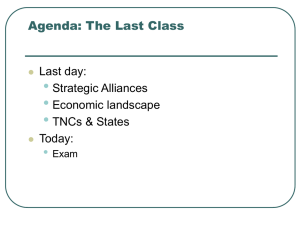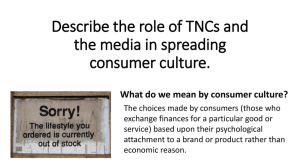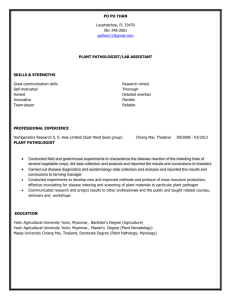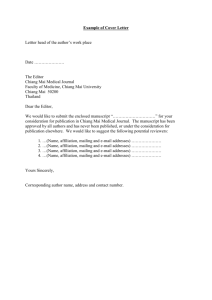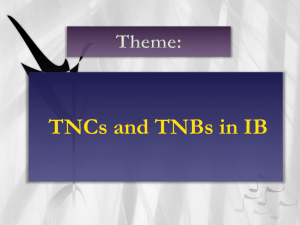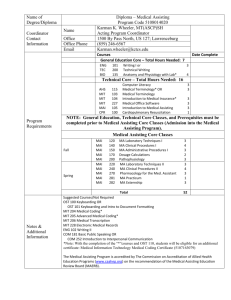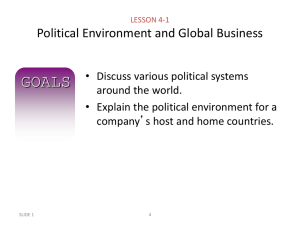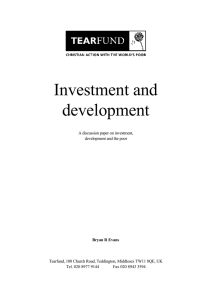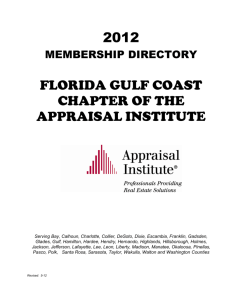MULTINATIONAL FIRMS – efficiency advantages of the stakeholders
advertisement
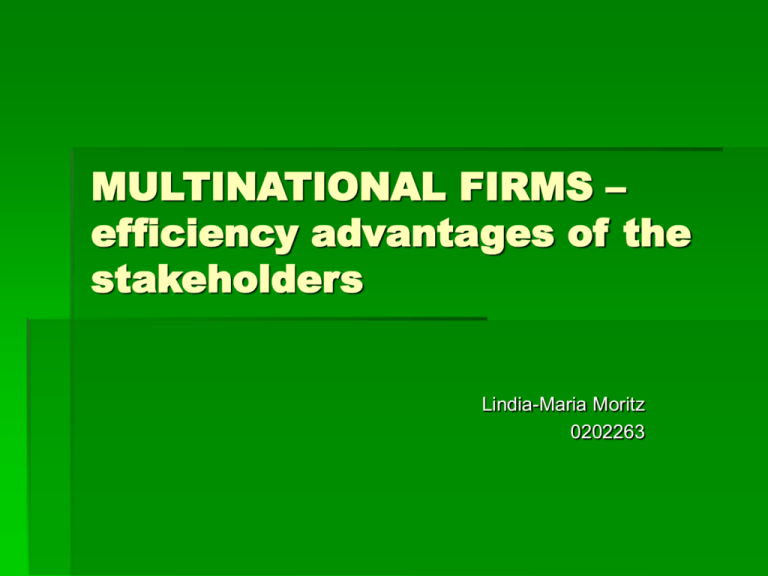
MULTINATIONAL FIRMS – efficiency advantages of the stakeholders Lindia-Maria Moritz 0202263 What are MNEs (Multinational Enterprises)/TNCs (Transnational Corporations)? Enterprises that engage in foreign direct investment (FDI) and owns or controls value-adding (service, production) activities in more than one country Capital flows between nations Rent seeking Development of the relationship between nation-states and foreign TNCs Over the last few decades periods of co-existence were followed by waves of nationalisation National governments face a continuing loss of bargaining and decision-making power vis-a-vis TNCs Development of the relationship between nation-states and foreign TNCs 1960s: FDI was widely welcomed. Towards the end of that decade governments began to exhibit concern with regard to the impact of foreign investment on the national economy. 1970s: Nations have been whittling away at the concept that foreign-owned businesses are presumptively entitled to non-discriminatory treatment 1980s: liberalism became the dominant discourse 1980s and 1990s: openness to FDI Development of the relationship between nation-states and foreign TNCs TNCs began to play a more direct role in the setting of international rules and disciplines Conflict of interests: The principal challenge is of ensuring that the differences in their goals and perspectives do not create such clashes between them as to undermine the essential role of each The Power of the Multinational Enterprise Multinationals move country to country in order to compete more successfully on labor and other cost The more the working conditions vary internationally, the more the companies are tempted to exploit these differences -> may lead to a world-wide lowering in wages and working conditions The Power of the Multinational Enterprise Due to theis size TNCs are major investors and job creators Possession of key technologies High growth-potential Of the 100 biggest economies in the wolrd half are multinational enterprises and not more than half are countries Enjoys political favors like tax exemption, statesuppression of workers or the assignment of export privileges The Power of the Multinational Enterprise TNCs increasingly penetrate every field of national government policy: Regional and employment policy Social policy Education policy Integration policy Technology policy Structural policy Competition policy Monetary policy Has globalization gone too far? Globalization os exposing a deep fault line between groups who have skills and mobility to flourish in global markets and those who either do not have these advantages The result is severe tension between the market and social groups with governments stuck in the middle Focus on three sources of tension between the global market and social stabiliy: Three sources of tension between the global market and social stabiliy 1. 2. 3. Reduced barriers to trade and investment accentuate the asymmetry between groups that can cross international borders and those that cannot. Services of large segments of the working population can be more easily substituted by services of other people across national boundaries Nations with very different sets of values , norms, institutions and collective preferences begin to compete head on in markets for similar goods Globalization has made it exceedingly difficult for governments to provide social insurance Social disintegration as the Price of Economic Integration? The challenge is to enable countries that are willing to engage in greater harmonization of domestic policies to do so, while also allowing them to selectively delink from international obligations when these obligations come into conflict with domestic norms or institutions The Role of National Governments Strike a balance between Openness and Domestic Needs Do Not Neglect Social Insurance The Role of International Institutions Important International Institutions in the globalization process: United Nations (UN) World Trade Organization (WTO) Organization for Economic Corporation and Development (OECD) Non-Governmental Organizations (NGOs) How to use the Power of the MNE to promote Human Rights: The case for the Model Business Principles In summer 1995, the U.S. administration passed the so-called Model Business Principles Provision of a safe and healthy workplace Fair employment practices Responible environmental protection and environmental practices Compliance with U.S. and local laws promoting good business practices Maintenance of a corporate culture that respects free expression consistent with legitimate business concerns How to use the Power of the MNE to promote Human Rights: The case for the Model Business Principles Goal is to build a world where “global norms of worker rights and environmental protection rise, so that profits increasingly result from inspiration and perspiration, not exploitation The philosophical Agenda: How to Justify Human Rights The Economic Agenda: Why is it Reasonable to Promote Social and Environmental Standards The philosophical Agenda: How to Justify Human Rights The fundamental philosophical question which is relevant is that of the possibility of justifying universalistic positions in principle The universal character of Human Rights implicates that they are to be respected by all humans Two reservations: These norms are characterized by an eurocentrism and therefore cannot be generalized The idea of human rights itself requires the recognition of differing opinions, which means also the acceptance of disapproving attitude towards them The Economic Agenda: Why is it Reasonable to Promote Social and Environmental Standards NGOs Many enterprises in the clothing and sports articel branches had to pass guidelines on ethical behavior in international business Companies become more and more aware that they can only survive in a healthy surrounding The MAI – Mulitlateral Agreement on Investment The MAI – Mulitlateral Agreement on Investment In 1995 startet negotiations for the Multilateral Agreement on Investment. The MAI is a proposed multilateral international agreement that is currently under negotiation at the OECD in Paris. If it is passed, the MAI will have profound impact on the way that governments treat foreign investment in all of the 29 developed country-members of the OECD The MAI – Mulitlateral Agreement on Investment Elements: Open all sectors Treat foreign investors the same as local companies Set binding dispute settlement rules Coverage Definition of Investment Subsidies Performance Requirements National Treatment Government Procurement Investment Incentives Reservations and Withdrawal Provincial Jurisdiction Expropriation The MAI – Mulitlateral Agreement on Investment Concerns: Closed secretive negotiations Opens developing countries Preemption of local, state and national laws All rights, no responsibility Effects on sustainability It‘s all about capital mobility The MAI – Mulitlateral Agreement on Investment Ethyl: Using an MAI-like provision of NAFTA, the U.S. based Ethyl Corporation has sued the Canadian government for $251 million in damages related to a public health and safety law. The MAI – Mulitlateral Agreement on Investment Immediately suspend negotiations, and undertake, with meaningful public input and participation, an independent and comprehensive assessment of the social, environmental, and development impact of the MAI. Require, in any final investment agreement, that multinational investors be made to observe binding agreements incorporating environment, labor, health, safety and human rights standards to ensure that they do not use the MAI to exploit weak regulatory regimes. The MAI – Mulitlateral Agreement on Investment Eliminate the MAI's expropriation provision so that investors are not granted compensation for a vague, broad notion of regulatory takings. Governments must ensure that they do not have to pay for the right to set environmental, labor, health and safety standards, even if compliance with such regulations imposes significant financial obligations on investors. Open the negotiation process to citizens, which will require, among other things, timely public release of draft texts and country positions and the scheduling of open public meetings and hearings in member and nonmember countries. Thank you for your attention!
